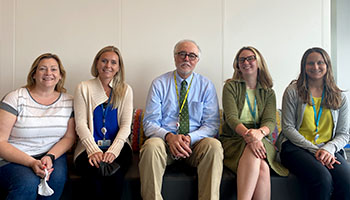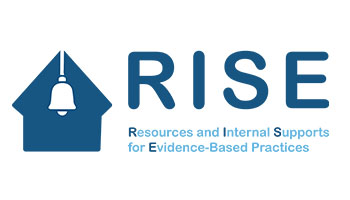HOW CAN WE HELP YOU? Call 1-800-TRY-CHOP
In This Section
Set for Success: Researchers Help City Schools Sustain Strong Mental Health Services

Ricardo Eiraldi, PhD, and his team are working on ways to help city schools provide sustainable behavioral health services.
As students settle back into classrooms across the city, Children’s Hospital of Philadelphia researchers are studying new ways to help schools provide strong, sustainable mental health services. For Ricardo Eiraldi, PhD, program director of CHOP’s Behavioral Health in Urban Schools Program, that starts with a simple concept: support.
While urban schools often provide behavioral health services, they frequently lack programs backed in research. Even when such programs are introduced, schools without sufficient internal capacity have a challenging time continuing them once research consultants depart. Through Project RISE (Resources and Internal Supports for Evidence-Based Practices), Dr. Eiraldi and his team aim to support city schools by adequately training school counselors in evidence-based practices (EBPs). The research study, if successful, could empower more schools in the Philadelphia area to help youth manage externalizing behaviors or internalizing problems.
“Most urban school districts don’t have the capacity to ensure that a school counselor who is implementing the evidence-based practice receives ongoing consultation because they don’t have personnel with sufficient training to do that job,” Dr. Eiraldi said. “This project attempts to create internal capacity within the school district to be able to use school employees to support the counselors and teachers once the researchers leave. This project is about how to best sustain the implementation of EBPs in schools.”
At the heart of Project RISE are three well-known, research-backed interventions, or EBPs.
The first of these, the Coping Power Program (CPP), focuses on externalizing behavioral problems such as physical or verbal aggression or disruptive behavior. First developed in the 1980s, CPP is a group intervention based heavily on cognitive-behavioral therapy, a treatment style that teaches individuals how to change their behavior and re-frame their thought patterns.
The second intervention, Check In/Check Out (CICO), focuses on behavioral concerns as well as internalizing problems such as depression and anxiety. Individual students “check in” with an adult at the start of the school day, receive feedback throughout the day, and “check out” again at the end of the day.
Finally, the third intervention, CBT for Anxiety Treatment in Schools (CATS), was developed by Dr. Muniya Khanna, a co-investigator in Project RISE, Dr. Eiraldi, and other investigators. CATS is a culturally appropriate adaptation for group implementation of two well-known EBPs, Coping Cat and Friends for Life.

Three Phases, Three Years
To kickstart Project RISE, Dr. Eiraldi and his team are currently working with an advisory board within the School District of Philadelphia to identify which schools will participate in the study, while simultaneously refining the training approaches they plan to implement. After that, the team will begin the first of three project phases over three years.
In phase one, Dr. Eiraldi and fellow research consultants will train school district coaches, counselors, and teachers in three EBPs.
In phase two, the school district coaches will provide consultation to counselors and teachers at the schools while receiving some support from CHOP’s research team.
Finally, in phase three, the school district coaches will provide consultation and supervision to counselors and teachers but this time, without receiving the research team’s support.
Dr. Eiraldi will compare these phases to a “consultation-as-usual” approach, wherein school district coaches still provide consultation and supervision but follow their own approach rather than the approach introduced by his team.
Markers of success
So, how does one measure the success of a research program like Project RISE? It’s all about how much and how well schools are able to cover the content of the EBPs over time, a concept that Dr. Eiraldi calls “fidelity.”
“What excites me the most about Project RISE is the chance to demonstrate that urban schools are able to sustain implementation of EBPs with fidelity when using their own resources, their own personnel,” Dr. Eiraldi said. “I would know this program is effective if, during year three of the study, we are able to see the schools continue to implement the three evidence-based treatments with high levels of fidelity and clinical effectiveness.”
And just as Project RISE consists of tiers of training and support, it’s also a true community effort in a larger sense. Studies like Project RISE are only made possible by the participation and hard work of schools, Dr. Eiraldi said
“In order to successfully implement a project of this type, you really need to have buy-in from the schools and the school district,” he said. “So we have administrators and clinicians from the School District of Philadelphia who are helping us think through all of the challenges and the potential ways to ensure this project is successful in the city’s schools.”
Project RISE is funded by a National Institute of Mental Health Award.